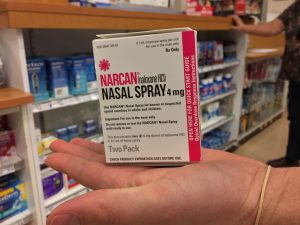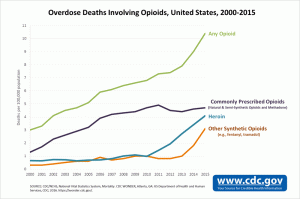By: Faith Isbell
Kroger in Lexington has joined CVS in selling Narcan, the opioid-overdose antidote, without a prescription to customers who ask for it.
“I think it’s great that [Kroger] is taking a proactive approach to try to combat the problem,” Buena Vista Police Chief Keith Hartman said.
Kroger last Monday announced its decision to make Narcan available in its Virginia pharmacies after Dr. Marissa J. Levine, the state’s health commissioner, declared in November that opioid addiction is a public health emergency.
CVS made the drug available without a prescription in May 2016.

Courtney White, a pharmacist at Lexington’s Kroger, said the store received its first shipment of Narcan about a week ago. The nasal spray costs $150, but White said it is covered by most health insurance plans.
“I’m all for it,” White said. “It’s a good tool for people to have at home.”
Narcan, or naloxone, is a fast-acting nasal spray used to treat opioid overdose. In the case of an overdose, Narcan can temporarily reverse the effects of the opioids until emergency medical care is provided.
Doctors often prescribe opioids to reduce moderate-to-severe pain following surgery or major injury. Standard opioids include prescription Oxycontin, Vicodin, morphine and fentanyl. Another common, but illegal, opioid is heroin.
According to the Centers for Disease Control and Prevention, the number of overdose deaths involving opioids—both prescription opioids and heroin—has quadrupled since 1999.
Today, more than six out of 10 drug overdose deaths involve opioids.
“But how many decades have we had a drug issue in the country here? It’s been 50 years that we’ve been trying to catch up on this,” Chief Hartman said.
Dr. Deborah Kreiss, a Washington and Lee University psychology and neuroscience professor, said she attributes heroin use to increasing rates of depression and anxiety in the United States.
“People, in a way, are self-medicating,” Kreiss said. “They just are drawn to it, because it’s such a good way for them to not feel the challenges that they associate with their lives. They really appreciate having that feeling that everything’s OK—that everything’s going their way.”
Hartman said most of the illegal opioids in Buena Vista are brought in from larger cities and neighboring counties, such as Nelson County and Augusta County.
“We’re a much smaller community,” he said. “I would think that a lot of our people get in their cars, go to those places, buy what they’re going to buy, and come back here.”
Detective Alan Buzzard, of the Rockbridge Regional Drug Task Force, has seen a similar pattern.
Buzzard said prescription drug abuse is common in Rockbridge County. But street drugs are becoming more popular—partly because the government has cracked down on regulating prescription medications.
“They can’t get the pain pills, so they’re going to the street drugs—heroin and meth,” he said.
Hartman agreed. “And it’s a lot cheaper,” he said.
But addicts are still finding ways to get prescription opioids.

In nearby Waynesboro, police last month confirmed the deaths of a 36-year-old man and a 44-year-old woman in a double overdose. Fentanyl, a prescription opioid 50 to 100 times stronger than morphine, was found at the scene.
“This should be a warning; however, the terrible truth is that users seldom know what drugs on the street really are or what they have been cut with, making every use a high stakes gamble with their life,” Waynesboro police said in a statement.
Buena Vista hasn’t seen an overdose in some time, Hartman said. But he said he would like for his officers to carry Narcan when on patrol.
Hartman said he’s sending two officers to Lynchburg at the end of the month to learn how to administer the antidote.
“Oftentimes, our guys get there first,” he said. “When they do, those two or three minutes could be the difference of saving the life.”
But Hartman knows a single antidote isn’t the solution to the nation’s drug addiction problem.
“I guess you could relate it to a war movie,” he said. “That’s the way it feels like when we’re dealing with the drug issue. You think you got a handle on it, and then you get another wave, and it just knocks you for a loop.”
Misty Gardner, 37, of Lexington, is an inmate at the Rockbridge Regional Jail and a recovered drug addict. She is serving time for a DUI and petty larceny—crimes unrelated to her former addiction.
The mother of two said she started abusing opioids 10 years ago when her son’s father, Jerry Ruley, 34, of Buena Vista, was shot and killed. She turned to methamphetamine, heroin and prescription opioids, such as Oxycontin and fentanyl, to cope.
“I’d wake up in the morning, and I’d need it,” Gardner said. “I’d drive up to Washington, D.C., two to three times a week for it. I didn’t have to feel anything.”
Gardner said she has been clean for about three years and has turned to alcohol instead.
“It totally ruined my life,” she said. “It ruined my relationship with my kids. I missed all the milestones in their lives. It takes a toll on you.”
Gardner said she thinks Kroger’s decision to sell Narcan is a good thing. But her experience with addiction has left her skeptical.
“You might bring someone back, but they’ll go right back to using,” she said. “That’s just prolonging the inevitable.”
“We’ll never win the war,” said Buzzard, the drug task force detective. “But we can win some battles.”
